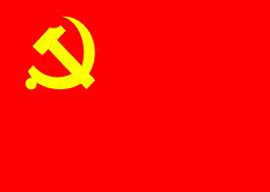
May 26, 2011

You think the 2012 Republican field is lackluster? Check out these party animals.
The “party” in that last sentence is the Chinese Communist Party. The gents standing in the picture are the aptly named Standing Committee (changwu weiyuanhui, literally “everyday affairs committee”) of the CCP’s Central Politburo. Except in the most strictly taxonomic sense, they are not animals, but human beings, or somewhat lifelike simulacra thereof. These are the people who run the affairs of the world’s most populous nation and will continue to do so for another year or so. The picture was taken in October 2007 and they serve five-year terms.
The members of the Standing Committee are so lacking in luster, one feels that the guy wearing a blue tie with his hands folded in front of him—it’s Wu Bangguo—might as well have gone the whole distance and worn a clown suit. The current ages, left to right, are 68, 55, 57, 68, 68, 69, 71, 57, and 67. Technocrats? You bet. From the left again: Numbers one and four are trained in geology, number two in economics and law, and all the rest in engineering—electrical, hydraulic, electronic, electrical, chemical, chemical. They have “rarely appeared in public together again,” we are told. I should think so: That much dullness all in one place might collapse spacetime.
I acquired that picture from a book called The Party by Australian journalist Richard McGregor. Published last year (I’m behind on my reading), The Party explains the miracle of China in recent years.
It’s not the ten percent annual growth figures: Any fool nation with a billion people could have done that, starting as they did from such a low base. No, China’s “miracle” this past quarter century is a political one: the survival of the communist system in all its lawlessness and control-freak brutality. You might almost say “half century”: I was hanging out with Old China Hands in the early 1970s, when the Cultural Revolution was in full flood. General opinion among the OCH’s was that the regime had committed suicide and would be gone before the decade ended.
Forward to 1989 and the nationwide demonstrations that culminated in the Tiananmen Square massacre. The regime seemed indecisive. Rumors circulated that a senior military commander was balking at party orders to move on the demonstrators. (McGregor says those rumors were correct: It was Lieutenant-General Xu Qinxian, commander of the 38th Army. He was court-martialed and sentenced to five years for his insubordination.) Well nigh everyone—including me, and including veteran dissident Wang Bingzhang—thought the game was up for the ChiComs.